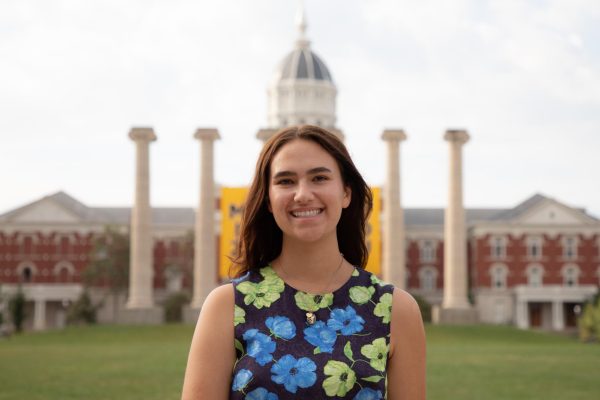Mother’s Day serves as a time for women to be recognized for their parental roles. For the roughly 220,000 mothers in post-secondary teaching in the United States, navigating academia can be difficult.
According to Kristin Schwain, a University of Missouri professor in the School of Visual Studies, two of the most difficult professions for women when she began her career were academia and law, as professional development coincided with fertility. When searching for jobs after receiving her doctorate in 2001, she was repeatedly given one piece of advice.
“Many women would remove their wedding rings when they went on job interviews,” Schwain said. “That was a common suggestion because of this fear that if they hired, you know, a woman who is still in childbearing years, that they would have a child and that would get in the way of their teaching and certainly their tenure clock.”
Amanda Paz Herrera recently finished her first year as an assistant teaching professor of biological sciences at MU. She has worked to balance being a mother and a professor. Her son was born in June 2023, 12 days after she defended her doctoral dissertation. Paz Herrera said she remembers having contractions during her defense meeting.
“It gave me that extra push that I needed, like, it gave this different sense of purpose to what I was doing, and it gave me that final motivation,” Paz Herrera said. “I want to say, I was already motivated, right? I already had a big ‘why’ that I was pursuing to get this Ph.D, but knowing that I was bringing a new life into this world, that I could also help in that same mission that I have for my students and the people that I meet, that have helped me as well, it moved me in a different way.”
In the late ‘90s, Lynda Kraxberger remembers struggling to find a maternity leave policy that would fit her needs. Kraxberger is currently the associate dean for Undergraduate Studies and Administration at the Missouri School of Journalism, but she was hired in 1993 as an assistant professor teaching in the KOMU newsroom. Kraxberger recalls at the time that full-time staff members at the University could earn up to six weeks of paid sick leave and six weeks of vacation. She approached the chair of her department to request that she combine this sick leave and vacation for a total of 12 weeks of time off.
“I felt kind of brazen to just demand something that I was just making up as I went along,” Kraxberger said.
MU’s current policy provides four weeks, or 160 hours, of maternity leave over a 12-month period for eligible University employees.
Paz Herrerra began as an adjunct professor at MU in 2023 to lessen her workload to spend time with her newborn. She remembers a strong community of women helping her throughout her academic career. According to her, these women served as mentors and inspirations, encouraging her to keep pushing for her dual dream of motherhood and teaching.
“Every single experience, every single woman that I encountered was one more vote of confidence that said, ‘You can be a scientist and a woman,’” Paz Herrera said. “The two can coexist.”
Often, mothers may navigate workplace expectations that are different from those of their colleagues. Schwain mentioned a term called “invisible labor” which was coined in 1987 by Arlene Kaplan Daniels, a sociology professor at Northwestern University. The term refers to work that is unrecognized and unregulated, but still expected.
According to Schwain, this kind of work is assumed of women in the workplace. “[Women are] the ones who are doing the mentoring or the advising, and they’re kind of expected to do it at the same time,” she said. “They’re not given credit for it, and they’re expected to bring it a kind of warmth.”
Mothers or expectant parents may also face social prejudice while navigating pregnancy. Heather Hunt was hired in 2011 as an associate professor in biomedical, biological and chemical engineering. She became a mother in her third year as a professor. While many colleagues were supportive during her pregnancy, one made uncomfortable and discriminatory comments directed toward her pregnancy.
“The only thing in my brain was, like, I cannot say anything, because he’s tenured, and he votes on my tenure, and if I shut him down in the way that I want to, I’m never getting tenure,” Hunt said.
Tenure grants a professor job security. To be considered for tenure, candidates typically undergo an extensive review process including a written application, committee reviews and approval by the chancellor.
Hunt was the director for undergraduate studies for MU’s Biological Engineering degree program from 2017-19, directed MU’s Biological Engineering online master’s program and was a Faculty Fellow with Missouri Online. She left MU in 2022, citing a lack of support from administration and frustration around different expectations for female faculty.
“It’s hard to love something that doesn’t love you back and I loved academia,” Hunt said. “I loved it. I would have died at my desk …What I needed was to occasionally be told that I’m valued and, like, supported when I do things like go up for promotion.”
For Paz Herrera, community and visibility play a large part in supporting mothers and professors.
“If there’s one thing that I’ve learned it’s that if there’s something that mothers can do amazingly it’s to make the table larger and to invite you to have a seat at that table,” she said. “So all of those women who have made that table larger for me, who have invited me to have that seat at that table, are part of the reason why, you know, I’m here today.”
Edited by Maya Dawson | [email protected]
Copy edited by Natalie Kientzy | [email protected]
Edited by Emilia Hansen | [email protected]
Edited by Chase Pray | [email protected]









